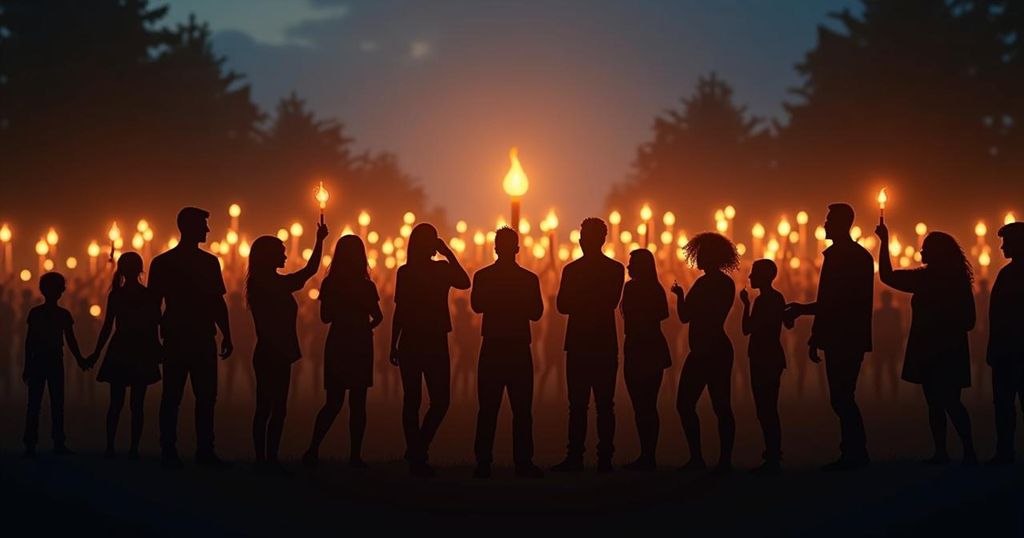On September 26, UMass Amherst students convened for a vigil supporting those affected by crises in the DRC, Sudan, Lebanon, and Palestine. The event fostered community solidarity and expressions of compassion, emphasizing that collective advocacy is essential in addressing global humanitarian issues.
On Thursday, September 26, approximately one hundred University of Massachusetts Amherst students gathered in solidarity on the sidewalk between the Student Union and Campus Pond lawn for a vigil honoring the lives affected by ongoing humanitarian crises in the Democratic Republic of the Congo, Sudan, Lebanon, and Palestine. The event was organized through collaborative announcements on the social media platforms of various student organizations including Students for Justice in Palestine, the Arab Cultural Association, and The African Students Association. The vigil took place in the context of escalating violence and humanitarian distress: the Democratic Republic of the Congo is experiencing severe bombardment, Lebanon is facing increasing Israeli airstrikes, and Sudan is grappling with significant shortages of food, water, medicine, and fuel, among other challenges. In Gaza, continued bombardment occurs amidst declarations from Israeli officials regarding ongoing military efforts. As rain lightly fell, attendees shared umbrellas and took refuge under nearby trees, some passersby halting to witness the emotional gathering. Participants were invited to express their thoughts publicly or engage in intimate discussions about the significance of the vigil. Senior biology major Ridha Alam, who serves as President of the South Asian Student Association, emphasized the importance of advocating for marginalized voices and fostering unity among diverse communities, stating, “It’s really important for people to go up there and use your voice for the voiceless and really open your hearts. It’s really easy to focus on what makes us so different, but if you think about it, we’re all fundamentally the same.” Maya Glenn, a senior, reflected on her past attendance at a similar vigil and expressed gratitude for the opportunity to come together once again, noting, “I feel like if we can come out and at least acknowledge what’s happening on campus altogether, maybe it can give us the push to speak out more, to know that we’re a collective.” She also remarked on the significance of the vigil’s location, stating, “There is something pretty symbolic and powerful about it.” A Lebanese student highlighted the importance of collective remembrance and support: “No matter what, everyone, in some way, is affected by these [events]. Whether you are ethnically related to these issues… or if you are just empathetic to the cause.” She stressed the commonality of human experience amidst global suffering, asserting, “We’re all human at the end of the day; we all bleed the same colors.” The vigil served not only as a moment of reflection for those affected by conflict and crisis but also as a unifying event emphasizing shared humanity, compassion, and resilience among attendees.
The vigil held at the University of Massachusetts Amherst was a response to growing humanitarian crises affecting several regions, particularly the Democratic Republic of the Congo, Sudan, Lebanon, and Palestine. Each of these areas is facing dire situations characterized by violence, displacement, and severe shortages of essential resources. The students sought to raise awareness about these issues and foster a sense of solidarity and community among those impacted by these global challenges. The event exemplified how local college communities can come together in advocacy and support, responding to international occurrences of injustice and suffering.
The vigil at the University of Massachusetts Amherst underscored the importance of collective remembrance and solidarity in times of crisis. Through thoughtful reflections and empowerment, attendees affirmed their commitment to advocating for those suffering due to conflict, emphasizing a unified human experience that transcends borders and backgrounds. Such gatherings not only serve to honor the lives lost but also invigorate community action toward justice and compassion. By sharing their voices, the students illustrated the power of unity in the face of adversity, reaffirming that every individual can contribute to global awareness and meaningful change.
Original Source: dailycollegian.com






